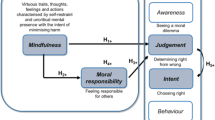ABSTRACT
A number of contemporary philosophers endorse a Pyrrhonian theme: that one has knowledge only if one knows or understands that one’s beliefs are reliably formed. Otherwise, one is like a man who grasps gold in the dark: such a man is successful, but his success is a matter of luck, and so not creditable to him. It is argued that the skeptical problem and the problem of moral luck share a common structure and a common solution. Specifically, a virtue-theoretic approach helps us to understand important relations among luck, success and credit for success. It is argued that knowledge is an instance of success through virtue, and that, in general, success through virtue is creditable to the virtuous agent.
Similar content being viewed by others
References
L. Bonjour (1980) ArticleTitleExternalist Theories of Knowledge Midwest Studies in Philosophy 5 53–73
L. Bonjour (2003) A Version of Internalist Foundationalism L. BonJour E. Sosa (Eds) Epistemic Justification: Internalism vs. Externalism, Foundations vs. Virtues Blackwell Oxford
J. Greco (1995) ArticleTitleA Second Paradox Concerning Responsibility and Luck Metaphilosophy 26 81–96
J. Greco (2004a) Motivations for Sosa’s Epistemology J. Greco (Eds) Sosa and His Critics Blackwell Oxford
J. Greco (2004b) How to Preserve your Virtue while Losing your Perspective J. Greco (Eds) Sosa and his Critics Blackwell Oxford
K. Lehrer (2000) Theory of Knowledge EditionNumber2 Westview Press Boulder
McKinnen, C. (2004): Agent Reliabilism and the Subjective Justification Requirement. Presented at the Pacific Division Meeting of the 2004, APA
T. Nagel (1979) Mortal Questions Cambridge University Press Cambridge
E. Sosa (1997) ArticleTitleHow to Resolve the Pyrrhonian Problematic: A Lesson from Descartes Philosophical Studies 85 229–249 Occurrence Handle10.1023/A:1004254711671
B. Stroud (1994) ArticleTitleSkepticism, ‘Externalism’, and the Goal of Epistemology Proceedings of the Aristotelian Society 68 IssueIDsupp. vol. 290–307
J.J. Thomson (1989) ArticleTitleMorality and Bad Luck Metaphilosophy 20 203–221
M. Zimmerman (1987) ArticleTitleLuck and Moral Responsibility Ethics 97 374–386 Occurrence Handle10.1086/292845
M. Zimmerman (1988) An Essay on Moral Responsibility Rowman and Littlefield Totowa, NJ
Author information
Authors and Affiliations
Corresponding author
Rights and permissions
About this article
Cite this article
Greco, J. Virtue, Luck and the Pyrrhonian Problematic. Philos Stud 130, 9–34 (2006). https://doi.org/10.1007/s11098-005-3231-3
Issue Date:
DOI: https://doi.org/10.1007/s11098-005-3231-3




